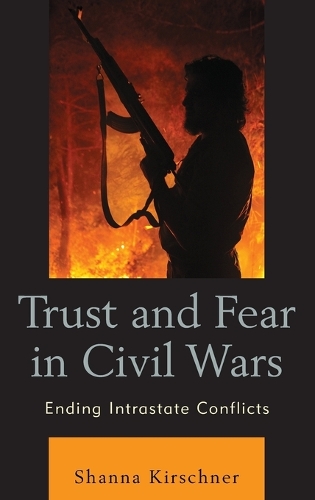
Trust and Fear in Civil Wars: Ending Intrastate Conflicts
(Hardback)
Available Formats
Publishing Details
Trust and Fear in Civil Wars: Ending Intrastate Conflicts
By (Author) Shanna Kirschner
Bloomsbury Publishing PLC
Lexington Books
14th November 2014
United States
Classifications
Professional and Scholarly
Non Fiction
Political science and theory
Peace studies and conflict resolution
327
Physical Properties
Hardback
200
Width 159mm, Height 240mm, Spine 20mm
413g
Description
Why do some civil wars last a long time, while others end relatively quickly Trust and Fear in Civil Wars examines the conditions under which individuals are willing to lay down their weapons under a settlement agreement. The author argues that wars are easiest to resolve when combatants believe that their adversaries will uphold a deal or that the costs of renewed war will be low. Several key sources of information inform this calculation. Drawing on both cross-national and case study data, including detailed interviews, the book demonstrates that when information suggests either that a peace agreement is likely to break down or that the results of a broken deal will be especially deadly, a settlement leaves combatants too vulnerable to countenance, resulting in wars lasting longer.
Reviews
Kirschners theory has the potential of being more broadly applied, which makes the book a worthwhile read. . . .Current conflicts such as in the Middle East, northern Africa and Ukraine show the obvious relevance of the theory. The quantitative analysis forms an interesting foundation to build future case studies from. The chapters containing case studies offer insights into the conflicts studied with the focus on trust and fear. . . .The findings from these semi-structured interviews do invite other scholars to conduct comparative research using the same hypotheses. * Kurdish Studies *
This engaging book seeks to explain why some civil wars last longer than others. Focusing on the feelings of insecurity experienced by groups and individuals in conflict settings, the author convincingly argues that adversaries who fear that a settlement has a high likelihood of collapsing and that its failure will be costly will be likely to engage in prolonged conflicts. Buttressing this argument is a novel theory of the role that particular kinds of information impart to combatants regarding their future security. Employing quantitative methods, well-developed case studies, and structured interviews with individuals in two of her civil war cases, the author finds that both state policy and adversaries behavior inform reputation in a manner that can make wars hard to end. Actors seeking to end civil wars will do well to keep in mind this analysis. -- Caroline Hartzell, Gettysburg College
Shanna Kirschner's book, Trust and Fear in Civil Wars, is avaluable contribution to the literature on the duration of civil war. In a careful, mixed-methodology empirical analysis the author confirms the idea that civil wars are hard to resolve if the parties do not trust each other to stick to their agreements. In a compelling extension, she shows that widespread fear of deadly repercussions if the agreement breaks down greatly exacerbates commitment problems. The analysis casts new light not only on why some civil wars last so long, but also on the dynamics of ethnic conflicts. -- Hvard Hegre, Uppsala University
In Trust and Fear in Civil War, Shanna Kirschner has made a valuable contribution to our understanding of the conditions under which lack of trust and fear among combatants prevents the termination of civil wars. Combining careful theorizing with quantitative tests and case studies, this book provides new insights into commitment problems as a key obstacle to ending wars through negotiated agreements. I highly recommend Trust and Fear in Civil Wars to students, scholars, and policymakers. -- Paul Huth, University of Maryland, and editor, Journal of Conflict Resolution
Author Bio
Shanna Kirschner is assistant professor of political science at Allegheny College.
